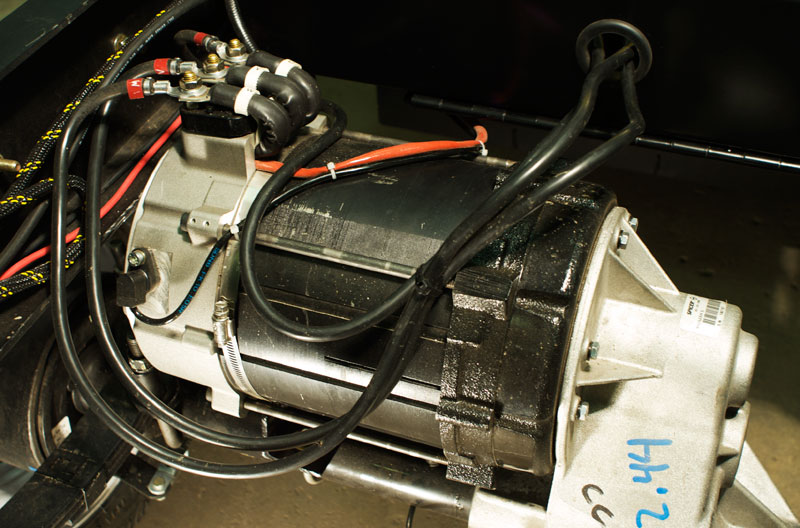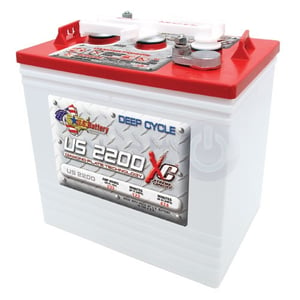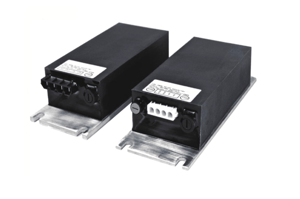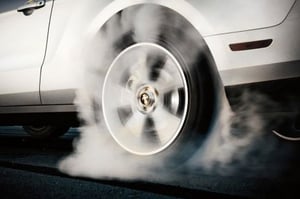In the small task oriented electric vehicle world there is much mention and acclaim given to AC drive. However, I get asked a number of questions about it from our customer service representatives, who are faithfully relaying the questions from our customers. Typical questions usually have to do with forming comparisons between AC drive systems and the age old DC systems still used by us and many other manufacturers. So why would you want AC drive on your vehicle? It's definitely become an industry buzz word, but if you're anything like me you want to know the how's and why's of what you're buying before spending any extra money. So I've created this snapshot of the differences and advantages of AC compared to DC drive systems.
1. Higher Torque – You can talk horsepower all you want, but it doesn't mean as much as torque. Torque is the measure of the actual rotational force the motor has and in comparably physically sized motors, AC motors handily outperform DC motors. While the DC motor may jump a little higher right off the line, it doesn't take long for their power advantage to decrease as you increase speed. By comparison, our AC motor can deliver its maximum power throughout most operating speeds, which makes a huge difference when you're driving up hill or carrying a lot of payload.
2. System Maintenance – AC motors are brushless, which mean there are no parts within the motor contacting each other and wearing out. It is theoretically possible to never have to maintain an AC motor for the life of the vehicle. (I say theoretically because our warranty department would string me up if I didn't. Consider this the Murphy's Law disclaimer.)
3. Broader Operating Environment – Since the motors have little in the way of serviceable parts, they are sealed and less subject to damage from dust, dirt, and water incursion, making them more suitable for harsh environments.
4. Tighter Vehicle Control – AC motor controllers are very sophisticated devices and "think" at a much higher level than DC controllers. Think of this as computing power. A DC control is a classic Commodore 64 computer, and an AC control is a brand new top of the line laptop. The result is better control of speed, deceleration, and interface with other vehicle systems.
Now this all sounds pretty great, but there are important things to consider when choosing AC drive, and I wouldn't be doing a fair job if I didn't explain these to you.
1. Higher System Cost – Since the motors and controllers for AC drive are much more sophisticated in their design and construction they do carry a premium cost. Remember though, you're not just paying for a shinier package or numbers on a piece of paper, there's real benefit to these systems.
2. Power Consumption – The simple truth here is that when you have the power available you use it. Period. If you had a Ferrari (or maybe you do) it is safe to assume you wouldn't (or don't) drive it like you would Grandma's grocery getter. And just like a higher power automobile consumes more fuel when driven hard, so will an electric vehicle. The result can be less range. However, our tests indicate that during normal driving can still achieve similar range to our DC drive system, which far exceeds what typical users drive in a day.
3. Less Dealer Level Customization – We've tuned these sytems to provide the best balance of power and efficiency possible, so we generally only allow our dealers to decrease the top speed. This is done for the protection of our customers in regards to both their safety and to maintain the integrity of what they've purchased.
I've personally been working with AC drive systems almost since their inception at Columbia. For that reason, I normally only drive vehicles with these systems installed and I can state in all honesty that my preference is definitely AC drive over DC drive and I highly recommend it. The benefits far outweigh the drawbacks, and deliver the best driving experience. In my mind a better driving experience matched with lower maintenance is a win-win situation for us and our customers.
Cheers,
Lisle



